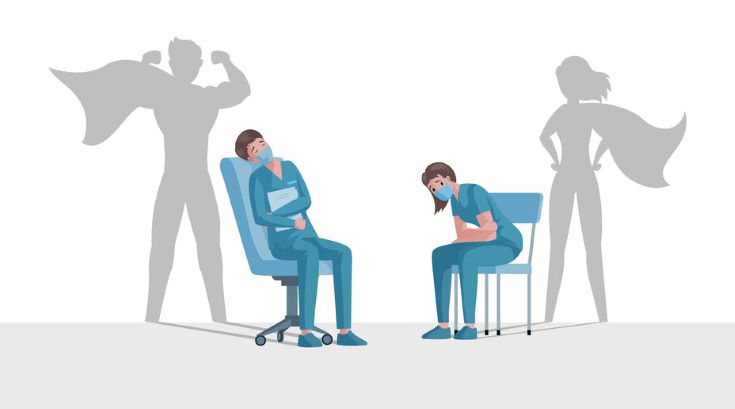Covid-19: Hidden heroes and mental health
Covid-19 has affected all sectors, cultures, beliefs, ages and professions. Emergency management, first response and crisis response teams are no exception as they work tirelessly to respond in this global crisis, writes Lyzi G Cota.

Hidden heroes: Emergency managers, crisis managers, first responders and healthcare workers who are still fighting the outbreak are now at risk of developing mental and physical exhaustion. Image: Pavlo Plakhotia/123rf
Living with Covid-19 and lockdown restrictions have already long-lasting and adverse effects, not only financially or physically, but in terms of mental health, too.
As soon as our mental health is threatened we show signs of distress and, if the situation is not adequately addressed, our minds become prey to side effects such as post-traumatic stress disorder (PTSD), anxiety, depression and, in severe cases, suicidal thoughts.
One of the more significant mental health links to Covid-19 is PTSD; it is a silent enemy and the majority of people who suffer it prefer to deny it owing to the global stigma around it and for fear of being ostracised.
Emergency managers, crisis managers, first responders and healthcare workers who are still fighting the outbreak are now at risk of developing mental and physical exhaustion because of their long working hours and exposure to stressful situations and harrowing scenes.
Prior pandemics have shown high levels of psychological distress, burn-out and PTSD among these groups of professionals; for example, the SARS outbreak in 2003.
This year has been a challenging one for professionals in this field since, besides the pandemic, they have also had to work on extreme events such as hurricanes, wildfires, industrial explosions, floods owing to dam collapse and civil unrest.
Emergency managers and crisis response teams carry heavy burdens of responsibility during their missions but their intricate and vital work is often unacknowledged or unbeknown to the general public.
The primary measures and extenuating functions that these hidden heroes perform in order to control the pandemic include:
Preventing the growth of the pandemic by identifying threats and hazards, planning and distributing information and public warnings, co-ordinating operations, sharing information and running screenings to detect cases
Protecting the population at local, state and federal levels by taking physical protective measures, creating protection programmes and activities, as well participating in the management of the supply chain dealing with international restrictions owing to Covid-19
Mitigating the effects of the pandemic by using all capabilities required to reduce long-term risks, loss of life and loss of property
Responding in a fast, but planned manner to save lives, protect the environment and fulfill basic human needs during the pandemic
Recovering the balance in communities affected by alleviating the consequences suffered
This workload can take its toll and be detrimental to their mental health – having to deal with infected cases and witnessing or experiencing the suffering and anxiety of affected citizens, while at the same time being at risk of they themselves getting infected and transmitting the virus to their families and friends will inevitably cause stress and anxiety.
In addition, the travel restrictions, both domestic and international, add another layer of complexity.
It is clear that the resulting effect does not only concern material resources and physical exhaustion; the breaking points are mental stability, increased anxiety, panic attacks and depression that occur after post-traumatic stress.
PTSD leads to a series of factors that modify personality and reality perception. Being under pressure to control the pandemic alters behaviours, mood, sleep cycles, while enhancing fears and anxiety responses.
Some appropriate measures that emergency managers and crisis response professionals can take during the Covid-19 pandemic include:
Processing experiences by talking with a partner, friend or family member
Spending quality time with family, pets and friends; taking time to relax
Writing the highlights and challenges of your day in a journal
Using mental health Apps to deal with PTSD, anxiety or depression
Using mental health hotlines to receive support
Maintaining proper nutrition and hydration
Going to bed early when possible
Releasing physical tension through exercise and activities like biking, hiking or running
Practising breathing and relaxation techniques to reduce stress
Taking a break from the pandemic by limiting news and media coverage
Limiting caffeine and alcohol intake
Avoiding overuse of medications and the use of drugs to relieve stress
Ultimately, try to work effectively – remember that working until exhaustion is not conducive to productivity and that your wellbeing matters, too.
September is Suicide Prevention month in the US and September 10 was World Suicide Prevention Day – according to the World Health Organisation, each year there are approximately 800,000 deaths worldwide that are attributed to suicide. This year is just as deserving of our attention as previous years, perhaps even more, as the PTSD effects of the Covid-19 pandemic will surely begin to appear among the community of emergency professionals before too long. For more infomation, visit the International Association for Suicide Prevention website.
Lyzi G Cota, 14/09/2020